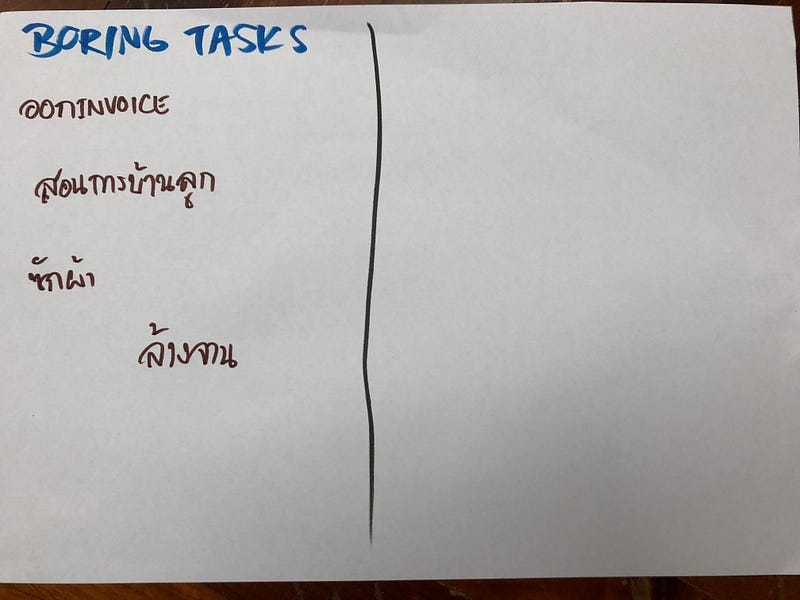Paradox in coaching self-organizing team
Recently, I read an interesting experiment from the book "Why we do what we do: understanding self-motivation" by a psychologist called Edward L. Deci.
In this experiment, the subjects were teachers. They came into the lab to teach students how to solve problems. They were randomly assigned to one of two groups, everything was the same for the two groups except for the fact that researchers made one additional statement to the teacher in one group, "remember, it is your responsibility as a teacher to make sure your students perform up to high standards". The researchers then tape-recorded the teaching session and did the analysis. The result was astonishing. The teachers to whom researchers had mentioned the additional statement spent 2x as much time talking during the teaching session as the other teachers. They also made 3x as many directives and 3x as many controlling statements such as "should" or "must".
In order to achieve good results in the students, many people in real life such as school administrators or parents pressure teachers to produce. The paradox is the more they do that, the more controlling the teachers become, which undermines intrinsic motivation and performance in the students. The harder the teachers are pushed to get results, the less likely it is that the important results will be forthcoming.
One essential element in coaching self-organizing team is to support team's autonomy. This experiment provides much food for thought on it.
1. Dedicated coach role
When introducing ScrumMaster role, one question arises - how does it differ from traditional team leader role? For ScrumMaster, a well-working team is her product. In the regard, traditional team leader shares the same responsibility. One could say that traditional team leader does more command and control, while ScrumMaster does more facilitation and coaching. What about team leader with facilitative and coaching style? Does it differ any more from ScrumMaster in that case?
Well, team leader is still responsible for the team performance, instead of team itself. This reflects the organizational hierarchy. Does it matter? Even though I have seen autonomy-supportive team leaders, as well as controlling ScrumMasters, taking the delivery responsibility away from coach role still makes a difference.
This reminds me of Michael James's keynote "Human Beings and Scrum" in Shanghai Scrum Gathering 2013. He stated, "Scrum is the only approach that dedicates a role to create environments for learning, innovative teams - without giving contradictory responsibilities." Delivery is one contradictory responsibility, as the associated pressure creates obstacle for promoting autonomy.
This can be confirmed by my own experience as development area manager in NSN time. Even though I had a deep belief on self-organization and autonomy, I unconsciously (only realized in retrospect) became more controlling when facing great pressure to release the product.
Therefore, there is a reason to believe that having dedicated coach role such as ScrumMaster helps coaching self-organizing team.
2. Coach's performance
As coach does not have the direct responsibility for delivery, how do we know if they are doing a good job? We could see it from the improvement of team performance. Furthermore, when considering self-organizing team, one essential aspect to see is whether team becomes more autonomous.
Coaches face the same paradox as those teachers in the experiment. When they feel more pressured in doing a good job, it is less likely that they will do. I draw the following CLD to illustrate.

The B-loop is the reason why they become controlling. The R-loop illustrates the long-term effect. When they become more controlling, intrinsic motivation is undermined, then team performance is degraded in the long run. Notice that the R-loop also works from the other direction - when they feel less pressured in doing a good job, it is more likely that they will do.
I remember that a few years ago, I had a conversation with a friend about this. She commented that it would be very hard for junior ScrumMasters not to feel pressured in doing a good job. This is natural as they need to demonstrate their ability for building confidence and trust. This is the same for ScrumMaster, internal coach, as well as external coach. ScrumMaster and internal coach get pressure from management, while external coach gets pressure from clients. How can they feel less pressured, thus more likely to keep autonomy supportive? Here are a couple of ideas.
Management or client believes in coach's intrinsic motivation of doing a good job, thus, gives space and time to coach. Performance evaluation works more like performance feedback session focusing on improvement rather than evaluation.
Coach makes their own effort not to hook onto the result. The proper state of mind is that they care, but not attached to the result. They care for the sake of caring. When they feel less attached, they feel less pressured, regardless of the expectation from outside. To me, this state of mind is similar to the one in those parents who are effective in helping child develop true self.
3. Parent's state of mind
Parents play an important role in helping child develop true self. They can be autonomy supportive or controlling, which nurtures or undermines intrinsic motivation accordingly. Parents face the same paradox. When they feel pressured to be "good" parents, they become controlling, which undermines child's intrinsic motivation. Eventually child would fail to develop true self.
As no "management" or "client" gives parents pressure to produce result, where do parents get pressure? They are certainly influenced by the society, such as other parents around them, teachers at school, etc. It is hard to change the social environment, same as it is often hard to change management or client's expectation towards coach. As parent or as coach, we both need to learn how to keep own autonomy in that environment.
I have a daughter. I surely care about her. However, she has her own true self to develop, and my self worth is not defined by her either. I view our relationship as enriching each other's life. With that view, I feel less pressured in producing certain result, thus, tend to be more autonomy supportive, which I hope will help her develop true self. I hold the similar state of mind when coaching self-organizing teams for clients.
Conclusion
Promoting autonomy is essential in coaching self-organizing team, while one obstacle is the pressure of producing result. The book "Why we do what we do" gives much more insights, and I would like to recommend it to any parents or teachers who have the interest in helping children develop their true self, as well as any ScrumMasters or coaches who have the interest in helping self-organizing teams develop their autonomy.





